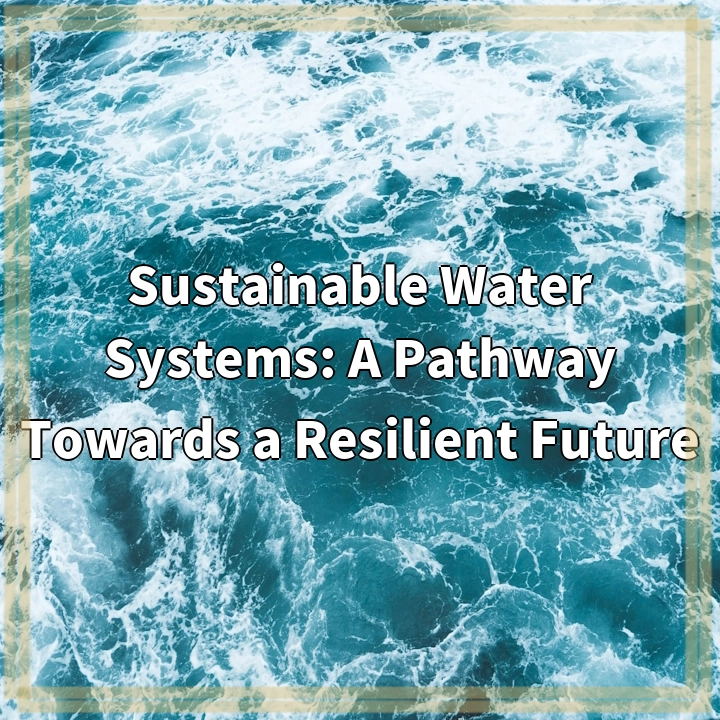
What it is:
Sustainable water systems are innovative approaches and practices that aim to provide reliable water supplies while minimizing negative environmental impacts. These systems take into account the water cycle, ecosystem dynamics, and human activities to ensure the long-term availability of clean and safe water.
Real-world problems:
Water scarcity
One of the main challenges of sustainable water systems is addressing water scarcity. With increasing population growth, industrialization, and climate change, water resources are becoming scarce in many regions. This scarcity leads to competition for limited water supplies, affecting agriculture, industries, and households.
Water pollution
Poor water quality is another critical issue that sustainable water systems aim to address. Industrial activities, agricultural runoff, and inadequate wastewater treatment can contaminate water sources with pollutants, including chemicals, heavy metals, and pathogens. Ensuring clean and safe water is essential for both human and ecosystem health.
Non-sustainable extraction
In many areas, water resources are extracted at unsustainable rates, leading to ecological imbalances and depletion of groundwater aquifers. Over-extraction of water can result in land subsidence, saltwater intrusion, and the loss of ecosystems that depend on sufficient water availability. Sustainable water systems strive to find a balance between human water needs and the preservation of natural water sources.
Flooding and water management
Climate change has brought increased rainfall intensity and unpredictable weather patterns, leading to more frequent and severe flooding events. Sustainable water systems incorporate innovative approaches to flood management, such as green infrastructure and nature-based solutions, to minimize flood risks and their associated damages.
Infrastructure resilience
Many existing water infrastructures are aging and vulnerable to the impacts of climate change. Sustainable water systems focus on building resilient infrastructures that can withstand extreme weather events, accommodate future needs, and minimize energy consumption and greenhouse gas emissions.
In conclusion, adopting sustainable water systems is vital for addressing the challenges of water scarcity, pollution, unsustainable extraction, flooding, and infrastructure resilience. By implementing innovative approaches and practices, we can pave the way towards a more resilient future where clean and safe water is available for all.

Solutions to the challenges:
Water scarcity:
To address water scarcity, sustainable water systems promote water conservation measures such as efficient irrigation techniques, rainwater harvesting, and water reuse. Additionally, implementing water demand management strategies, such as water pricing policies and public awareness campaigns, can help manage water resources more effectively.
Water pollution:
Sustainable water systems focus on improving water quality through enhanced treatment processes, implementing stringent pollution control measures for industries and agriculture, and promoting sustainable land management practices. Investing in proper wastewater treatment infrastructure and implementing strict regulations can greatly contribute to reducing water pollution.
Non-sustainable extraction:
To tackle the issue of non-sustainable water extraction, sustainable water systems emphasize the importance of integrated water resources management. This involves setting sustainable abstraction limits, implementing water allocation schemes, and promoting water-efficient practices in various sectors. Additionally, promoting the use of alternative water sources such as desalination and recycled water can help alleviate pressure on freshwater resources.
Flooding and water management:
Sustainable water systems incorporate nature-based solutions and green infrastructure to mitigate flood risks. These approaches include creating natural floodplains, restoring wetlands, and implementing stormwater management systems that mimic natural water absorption. Effective flood early warning systems and community engagement in flood management planning are also crucial components of sustainable water systems.
Infrastructure resilience:
In order to enhance infrastructure resilience, sustainable water systems prioritize the adoption of climate-responsive design and construction practices for water infrastructure. This includes building infrastructure that can withstand extreme weather events, incorporating nature-based features, and integrating smart technologies for efficient water management. Regular maintenance and retrofitting of existing infrastructure play a significant role in ensuring their long-term resilience.
By implementing these solutions in our water management practices, we can make significant strides towards a more sustainable and resilient water future. These approaches not only address the challenges at hand but also contribute to the conservation and preservation of our precious water resources for generations to come.















